

Appointed Editor of the Westralian Worker by the Board of Directors of the People's Printing and Publishing Company at their meeting of the 31 January 1917. 20 candidates from across Australia applied for the position.
After being reduced to three that Mr John Curtin be appointed Editor - Carried - the voting being 5 for 1 against. The appointment was made subject to good conduct and satisfactory work. Weekly notice on either side to be given pending other arrangements. 1
At the 20 June 1917 meeting of the Shareholders of the People's Printing & Publishing Company, the chairman Mr J.B. Holman stated:
In February last year Mr Curtin was appointed Editor, and with the more vigorous policy the 'Worker' has increased in popularity, and its circulation was rapidly growing. 2
Writes to fiancee Elsie Needham in Hobart, Tasmania, describing his farewell from Victoria and journey to WA.
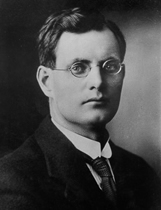
JCPML. Records of the Curtin Family.
John Curtin aged 34 years, December 1919. JCPML00381/16
Arrives in Western Australia 'this week by Katoomba looking fit and well' 3 to become editor of the Westralian Worker. Rents a home in Railway Parade, West Leederville.
Says the Sunday Times – 'Jim Curtin, a fire-brand from the Eastern States, is to edit the Worker. There may be a Jim Curtin in the Eastern States who is a sword-swallower, fire-eater, or something of the kind, but the Jack Curtin who comes to us is regarded in the East as a bright and brainy journalist, whose opinion is valued. A fighter, it is true, but one who fights clean and in the interests of the masses.' 4
Alexander McCallum, secretary of the Labor Party in Western Australia and a director of the Westralian Worker met the Katoomba in Fremantle. Victor Courtney recalls that the 'Jack Curtin we met … was a slightly built earnest looking young man' who 'dressed neatly and quietly' and looked more like a uni professor than a leftist politician.5
Also on board the Katoomba was Adela Pankhurst who was starting a speaking tour of Western Australia. Curtin was under pressure from the conservative press to ignore Adela Pankhurst’s speaking tour, however he 'would have none of it,' and reported that her 'passionate detestation of bad social conditions involving child and women labor at sweated rates,' had won her 'the right to be heard wherever she goes.' 6
Adela Pankhurst .was a feminist and pacifist whose political affiliations shifted from communism to strong anti-communism over her lifetime of activism. Born in England, the daughter of Emmeline Pankhurst, Adela was involved with the British suffrage movement from her teenage years and then the Women's Social and Political Union which was founded by her mother and sisters in 1904. She later became estranged from her family and moved to Melbourne in 1914 partly for health reasons. Once there she worked with Vida Goldstein and the Women's Political Association and campaigned against conscription particularly with the Women's Peace Army. She also joined the Victorian Socialist Party. She married Tom Walsh, a fellow anti-conscriptionist, in 1917. After the war they moved to Sydney and had five children. They were foundation members of the Communist Party of Australia, but soon withdrew. Adela’s evolving anti-communism became starkly apparent when, in 1928, she founded the Australian Women's Guild of Empire. Pankhurst used this conservative patriotic organisation as a platform to advocate the need for industrial cooperation, and she frequently spoke out against strikes. She ended her public life in 1943 with her husband’s death. 7
Attends meeting of the Board of Directors of the People's Printing and Publishing Company and is welcomed by the Chair, Mr J.B. Holman.
The Chairman on behalf of the Directors extended a hearty welcome to Mr Curtin and assured him that he would receive their every assistance.
Curtin was welcomed to the Company by Director Mr P.R. O'Loghlen.
I will help the new Editor all I possibly can. There were 20 candidates from all parts of the C'wealth and it was a tribute to his previous work to receive the appointment.
Additional congratulations were offered by Director Mr A. McCallum. Curtin expressed his appreciation for their comments.
Mr Curtin returned thanks first for the appointment and for the encouragement given him by the Directors. He realised fully the many difficulties before him. It will be some time before I get my feet. I agree with the policy you put before me. The paper as the official organ is our chief means of attack. My first endeavour will be to try and make the movement solid. I will [use] my work to prove the worth of your appointment.
At this meeting, Mr McCallum suggested that as Editor, Curtin "should take the first opportunity to visit different parts of the State". 8
Federal election campaign.
During the Federal election campaign, Curtin warns his readers that 'the election would have "deep significance" for the "future of the white race", claiming that the government would dismantle the White Australia Policy and replace "Anzacs with Chinese" while the "white sons of Australian mothers are fighting for the Empire on the blood-stained fields of France".' 9

Adela Pankhurst
Image courtesy Marxist Internet Archive'sEncyclopedia of Marxism at http://www.marxists.org/
glossary/people/p/a.htm
Speaks at a Sunday night meeting. The subject is 'What is Fusion?' 10
Adela Pankhurst’s lecture on 18 March at Perth Trades Hall launched a regular series of Sunday talks and it was probably Curtin who prompted this innovation in Perth’s Labor calendar. 11
Fiancee Elsie Needham arrives in Perth from Tasmania.
Receives letter from Abraham Needham, Elsie's father, written on 2 April 1917:
'… when the train steamed out of the station at Hobart bearing Elsie away, it was as if the sun had suddenly gone out. … That was, I suppose, only natural feeling. And afterward we thought it unfair to you, but we couldn’t help it. Dear boy, we have the utmost confidence in you, do not forget. … We would not have her back in maiden loneliness just for our gratification. The tears we shed we are almost ashamed of – why should we weep at the gratification of her highest desires. So we believe that all is well. We are contented – and more – we are infinitely pleased that she has chosen you and that you have given yourself to her.'12
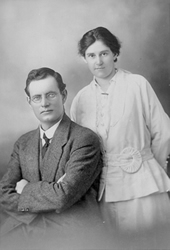
JCPML. Records of the Curtin Family.
Elsie and John Curtin, October 1917
JCPML00376/14
Wedding day of John Curtin and Elsie Needham.
Married by a Justice of the Peace, Mr Penna. Only two guests – witnesses – Enid Marks and Dave Watson, (colleagues from the Westralian Worker) and no honeymoon to follow.
'...a week after I arrived in Perth, John and I were married by Mr Penna, JP, by arrangement with the Registrar, in the dining room of his home in West Leederville. After the ceremony the four of us took a tram ride to Perth and went to the old Moana Cafe for tea and cakes. The only indication that it was a wedding party was the tightly rolled marriage certificate which I insisted on clutching throughout and the brand new ring on my third finger, left hand.
After this John and I boarded another tram and set off for our first home together – to discover that our furniture, ordered for early that morning, hadn't arrived. We spent our wedding afternoon sitting on the packing cases which had brought my belongings from Tasmania. We were frightened to leave the house even to go to the nearest store for weekend provisions in case we missed the carrier.
At 7 pm there was a flicker of light outside. It was the carrier, striking matches to find the street number. The next day, Sunday, was a busy day. We had to set our house in order and be ready soon after tea to go to Midland Junction, where John was to address a political meeting.13
Receives letter from Elsie’s father, written on 2 April 1917:
'We both will be in spirit at your wedding ceremony and in anticipation, Jack, now receive our paternal and maternal blessing on that occasion and imagine us standing by your side and afterwards casting rice after you – as well as performing all the time-honoured customs.' 14Votes in Federal election.
Labor suffered a significant loss as Prime Minister Hughes' candidates swept the polls, gaining all the Senate seats and winning a large majority in the House of Representatives.
Informal discussion with Australian Labour Federation delegates and union officials about the Westralian Worker and its operations in the movement . 15
Curtin's journey to the Goldfields and Westonia was at the request of the Board of Directors of the People's Printing and Publishing Company at their meeting of 9 May 1917.
Johnson/McCallum: That the Editor be asked to arrange as soon as convenient a visit to the Eastern Goldfields and Westonia. 16
Mr Somerville, a Director of the People's Printing and Publishing Company reported on the discussions at the 28 June 1917 meeting of the Board of Directors.
Mr Curtin held a meeting of union officials and I [Mr Somerville] also addressed the meeting in matters that were placed before the Shareholders annual meeting. 17
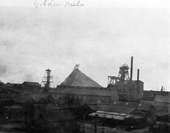
JCPML. Records of Alex McCallum.
Golden Mile, Kalgoorlie, 1917.
JCPML00830/175/127
Speaks at a mass meeting.
'His forceful and eloquent address created a most favourable impression, and his ideas on the nationalisation of industries affecting the life of the people and the conduct of the war evoked hearty applause.' 18Addresses a meeting of Loco Drivers, Firemen and Cleaners’ Union. 19 |
Addresses a mass meeting on 'Labor and the War'. The meeting is held under the auspices of the Women’s United Campaign Committee.
'For over an hour he held his audience as in fluent, eloquent and forceful language he rapidly and lucidly traced the origin, aims and history of the Labor movement throughout the world." 20Monday 25 June
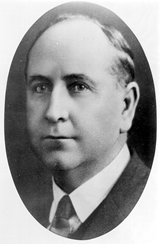
JCPML. Records of Bobbie Oliver.
Philip Collier, [Premier of WA]
1924-1930, 1933-1936. JCPML00568/4/3
Attends a Sunday afternoon demonstration in Fremantle, against the rising cost of living brought on by the war.
'The protesters marching from the Trades Hall to the Prince’s Theatre where they listened to speeches by Collier, Curtin and others.' 22
Philip Collier (1873-1948) was Labor member for the Legislative Assembly Goldfields seat of Boulder from 1905 until his death, the second longest continuous term served by any Western Australian member of Parliament. He led the ALP from 1917 to 1936, including two terms as premier, from 1924 to 1930 and again from 1933 until his resignation in 1936. 23
Addresses (with Alex McCallum) a meeting held under the auspices of the Women’s United Campaign Committee.
'It is many a long time since the Boulder Town Hall was crowded to the extent that it was on Sunday last to hear the addresses delivered by Messrs J. Curtin and Alex McCallum … There was a note of exultant excitement right throughout the proceedings both with regard to the audience, and the speakers…' 24
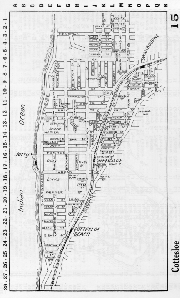
Map of Cottesloe, c 1924. Perth Metropolitan Streets and Roads with Index.
The Imperial Map Directory
Moves from house in Leederville to rented accommodation at 3 Napier St, Cottesloe, situated midway between the Swan River and Cottesloe Beach and close to the Cottesloe Railway Station.
We lived for three months in West Leederville, but John always had a hankering for the sea. He found a timber house to rent in Napier Street, Cottesloe, near Broome Street, and we took it. John saw very little of the sea, except at weekends, when he would take me for a constitutional along the waterfront.
He left home early in the morning – he had to catch a train to Perth – and worked long hours in the Worker office. He loved writing. Two or three nights a week he was out at political meetings. He loved politics, too. 25
Is elected to the committee of the Australian Journalists' Association (AJA) to represent the Kalgoorlie subdistrict.26
John Curtin joined the AJA as soon as he arrived in WA to take up the position of editor of the Westralian Worker 27 . Once on the committee, he attended meetings held as frequently as once a week, usually Tuesday lunchtimes, at the AJA city office.Presents a lecture on the 'Industrial Situation'. 28
'Every seat in the spacious building was occupied. The first half hour was devoted to a more than ordinarily attractive musical programme, after which the chairman called upon Mr J Curtin for his address. The speaker was in splendid form and held the audience from start to finish. It was good to see the faces of the sprinkling of opponents when he dealt with Taylorism, particularly the exposure of the trickery resorted to by the associated Governments to mispresent the workers’ case. It is safe to say that more than one scoffer left the hall with a prayerful heart. In his closing remarks the lecturer made a powerful appeal for Labor to realise that the preservation of future peace could only be secured by its own organisation, and resumed his seat, amid echoing applause.' 29
8 pm
Speaks at Labor Campaign Opening Night for the WA State elections. 30
Gives an address in support of Mr Lutey’s candidature. 31
John Thomas Lutey was first elected to the Western Australian Legislative Assembly as the ALP Member for Brown Hill-Ivanhoe, on the 9 August 1916.23 September
Gives an address (with Mr Simons) on the current political situation.
'There was a packed house to hear Mr Simons and Mr Curtin, and both delivered splendid and masterly addresses which were listened to and followed with the greatest of interest by the large audience.' 33
John Joseph Simons (1882-1948) arrived in Western Australia from South Australia c. 1890s. He became the co-founder in 1905 of the Young Australia League, and co-founded the Call, a weekly newspaper. He was the secretary of the WA State School Teachers Union until 1917, and a prominent anti-conscriptionist. He contested both federal and state seats for the ALP, and was eventually elected to the Legislative Assembly for East Perth. Subsequently, a rift developed between Curtin and Simons over articles Simons wrote criticising trade unionists, though they did meet during Curtin’s last illness to reminisce about their days in Perth. 34
Election day in WA.
The Labor Party, divided over the the issue of conscription, loses further seats, holding only fifteen out of fifty lower house seats. Sir Henry Lefroy is Premier, leading a National Government based on a coalition of ALP defectors, led by John Scaddan.
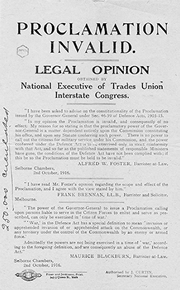
JCPML. Records of the Curtin Family. Flyer about the conscription issue,
2 October 1916.
JCPML00398/9
Opens (with Alex McCallum) the anti-conscription campaign. 35
Alexander McCallum (1877-1937), was general secretary of the ALP in Western Australia from 1913 and MLA for South Fremantle from 1921 to 1935. As a director of the Westralian Worker he was closely associated with Curtin in the 1920s. 36
'Curtin played a very active role in the anti-conscription campaign in the West. At street corner meetings and in the Worker he became more and more vehement in his opposition to Hughes’s proposals.' 37
Anti-conscription meetings chaired by Curtin were often disrupted by gangs of soldiers and hoodlums – some to the point of danger, and whole halls were wrecked. On one occasion Curtin was hit by a rotten egg. There were two plebiscites on conscription, at the first on 28 October 1917, a majority of 72,476 people voted ‘No’. In the second in December 1917 the vote in Western Australia in favour of conscription dropped by 20,000. 38
John Curtin had been involved in the anti-conscription battle in Melbourne before coming to Perth. In 1916, as Secretary of the National Executive, he authorised the flyer pictured to the left.
Curtin was praised by the Board of Directors of the People's Printing and Publishing Company at their meeting of 24 January 1918 for his role in the campaign.
That the Directors place on record their hearty appreciation of the good work done by Mr Curtin as Editor of the Worker during the Conscription Campaign. 38a
Speaks at an anti-conscription meeting.
'So many people turned up that Curtin and his fellow speakers found that the "carrying power"’ of their voices, in the absence of artificial amplification, was "taxed to the very utmost" as they tried to reach the edges of the crowd.' 39Gives a speech on anti-conscription.
'A young man should have as much right to decide for himself whether he would enlist as a married man, many of whom were supporting the proposals. The proposals left untouched the great bulk of the manhood of the country and made it compulsory for the less numerous class to serve.' 41
12 December
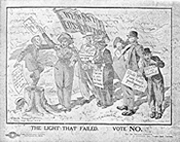
JCPML. Records of the Curtin Family. Anti-conscription cartoon, ca 1916. JCPML00399/3
Gives a speech on anti-conscription. 42
At this meeting Curtin’s words were, 'scribbled down by a detective sitting at the back of the crowd who later charged him with making a statement "likely to cause disaffection to His Majesty", in that he urged "rebellion" on the crowd if conscription was forced upon them.' 43
Tuesday 18 December
Is charged with 'having on December 12, at Perth, made a statement by word of mouth likely to cause disaffection to his Majesty contrary to paragraph 28 (1a) of the War Precautions Act.' 44
In court the detective who charged Curtin 'admitted that "he did not know any other speaker who spoke as fast" as Curtin. … The police were unable to transcribe a speech at the rate Curtin delivered it … A reporter with the West Australian testified that the police report was misleading, supporting Curtin’s story that he had actually said that, "‘Hughes would be guilty of rebellion"’ if he introduced conscription against the will of the people. … Despite the evidence Curtin was fined £15 , although he immediately appealed the decision.' 45
In April 1918 'the federal Labor leader, Frank Tudor and the Queensland Labor Premier, Tom Ryan, committed the party to supporting recruiting in return for various concessions from the Government, which included the convictions and fines against Curtin and Collier being set aside.' 46Votes in Second Conscription Referendum
A substantially higher majority of Australians and Western Australians voted against the introduction of conscription for overseas service than in the first referendum held in 1916. Only WA retained a sizeable 'Yes' majority.
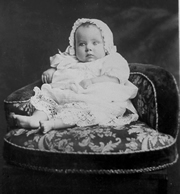
JCPML. Records of the Curtin Family. Elsie Milda Curtin,
30th May 1918.
JCPML00382/2
The birth of a daughter, Elsie Milda Curtin.
'The birth came prematurely "after a trying, bumpy journey in a horse-drawn sulky to Fremantle quay to farewell some friends."' 47
'Young Elsie was born at the end of December, 1917, a month before she was expected, and "Dad." As I called him from then on, had to take up housekeeping with no wifely briefing or advance preparation.
But he'd always been ready to roll up his sleeves and wash up or wield a broom if necessary. He was not very good as a cook, but he could get by – and he never forgot to order extra milk for the small black kitten which had attached itself to our household a few weeks previously, though he was never very keen on cats. A dog was his idea of a household pet.'48